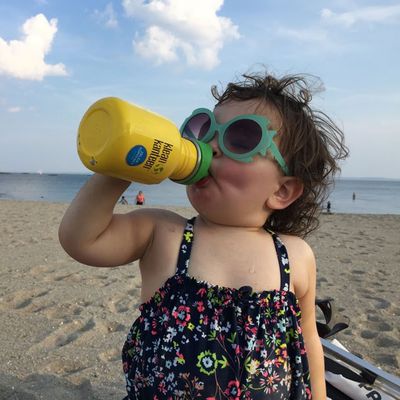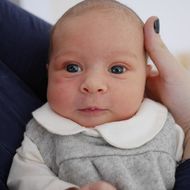
A recent study done at the University of Washington found that children are more concerned than their parents about how much of their lives are shared online. They also want rules to govern how and what their parents share.
At 2, my daughter is too young to know anything about this, though I’m sure it will come up sooner than I expect. And when it does, I’ll do my best to respect the way she wants to manage her online presence. I’ll be a bit sad, though, because sharing our lives together has become an essential part of my experience as a mother.
I didn’t go into pregnancy with a social-media plan. Because both my husband and I were writers on the internet, though, it’s common for us to share daily bits and pieces of our lives with a small but nebulous “public.” Most of the time, not very many people are listening, but the potential audience is … everybody. Anybody who has ever achieved overnight “infamy” for a misfired tweet knows that the audience can slip from almost no one to seemingly everyone in a few moments. But even though I know that the internet can be a cesspool, it has also been the place where much of my work, many of my jokes, and plenty of my joy have resided.
But any pregnancy is fragile in its early days, and mine was deemed high-risk almost from the start. So even after we told our friends and co-workers, around 16 weeks, my husband and I didn’t talk about this part of the future online. The subject never even came up between us — we simply didn’t share. By the end of my pregnancy, I’d told everyone I knew that we were having a daughter, but only posted a few Instagrams of children’s books and clothes. Several people I didn’t know personally tweeted at me, asking if I was pregnant. How impolite! I thought momentarily, before realizing that, over years of sharing some version of myself online, I had invited the question, or at least created the illusion that it might not be completely unwelcome.
Then my daughter was born, and it was so clear that she was a tiny, whole person. Her outline was vague but distinct from that of other babies I had known — including babies I had known, it should be said, via Instagram, the children of friends and sometimes acquaintances all over the world. I felt I knew their babies personally; I refreshed several times a day to see their little faces. We didn’t immediately participate in that flood of sharing — we knew well enough to be cautious. But when she was about 2 weeks old, we all had a particularly good morning. Her umbilical cord had dropped off, her button was looking good, and I felt up to dressing her in a complicated (read: more than one-piece) outfit. Once she was dressed, my husband, Josh, posted her photo to Instagram.

This opened a floodgate, particularly for me, because I was spending the bulk of my time alone with her. I started, slowly at first, then several times a day, to share photos of her, mostly on Instagram, but sometimes on Facebook, and much more rarely (because it’s less personal and less chatty) on Twitter. These updates said “Hey! Hi! Here we are!” to a world in which we were barely participating. I missed my old friends and family, and this was a way of reaching them from within our cozy, isolated dream state.
I quickly found that there was a large community of mothers out there doing the same thing. I became friends with these women through commenting on photos of their children, and they on mine. Mothers of friends of mine — women in their 50s and 60s whom I had never met — suddenly began commenting on my daughter’s growth and habits.
In those early days, which could be long and lonely, these relationships had real meaning. As spring sprung and we got back to “real” life, the online world of Zelda continued to prosper. Because I was still not back to work, I had lost real contact with many of my professional acquaintances and friends, but the conversation we had over our mutual affection for my daughter held us together.
We often talk about all of the downsides of this type of sharing, or of overdocumenting our children’s lives, but there was no downside for my daughter’s grandparents, who experienced her first giggles and crawls via texted video clips. With close friends I trade private snapshots of her even more avidly.
Now that she’s 2, I have begun to think more about how and with whom I share her photos. My Instagram account is private, and I rarely share her photos on Twitter, which is open to pretty much any rando. But still, when I open my mailbox to find a little envelope of stickers or a birthday present from a friend of a friend who has never met Zelda, it’s hard to feel too deeply the negative effects of sharing her with the world.
I do respect her privacy, too. In the mornings I sometimes hear her whispering to herself in the dark in her crib, and I think, I’ll just let her be alone with her thoughts for a few more minutes. As I close the circle more tightly around her, to allow her the space to forge her own identity, I try not to forget that she wakes up every Tuesday morning in expectation of the garbage men waving to her, that she knows what stamps are for her handmade thank-you cards, and that she takes incredible joy at the reflection of her face in a digital camera. She loves herself, and she loves to share, whether it’s a Popsicle or a painting she mails off to a friend of a friend for their birthday. She’s also, by the way, learned to take a pretty mean selfie.
I recently asked a close childhood friend of mine and her teenage daughter what their thoughts were on all of this. I sent them a group Facebook message. The daughter, surprising no one, answered first, almost immediately: “[W]e’ve definitely had this kind of conversation, but it’s been more along the lines of ‘stop commenting on EVERY one of my pictures’ … or ‘stop liking my friends’ photos of me.” That is, moving forward, I see, my most dangerous fault: my absolute and crushing certainty of her value. My never-ceasing “liking.” My endless hearts and comments on her.
I respect parents who choose not to share photos of their children online. I think that’s a very valid and reasonable way to deal with the sometimes-weird and sometimes-scary realities of the internet. That said, for me it’s been an integral part of the early period of my daughter’s life. Maybe it’s because I’ve worked online for so long, or because I’ve had so many positive experiences here and made so many friends, but I just can’t find it in my heart to hide her from the world just yet.




